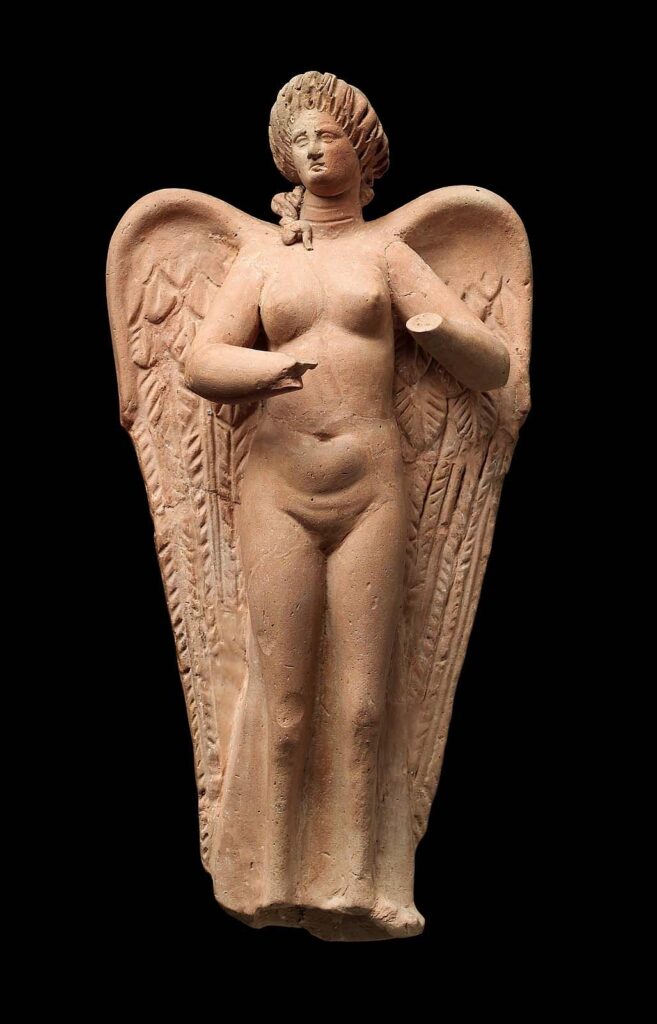
5.12
[1] Nūntiō Psȳchē laeta flōrēbat et dīvīnae subolis sōlāciō plaudēbat et futūrī pignoris glōriā gestiēbat et māternī nōminis dignitāte gaudēbat. [2] Crēscentēs diēs et mēnsēs exeuntēs ānxia numerat et sarcinae nesciae rudīmentō mīratur dē brevī pūnctulō tantum incrēmentulum locuplētis uterī. [3] Sed iam pestēs illae taeterrimaeque Furiae anhēlantēs vīpereum vīrus et festīnantēs impiā celeritāte nāvigābant. Tunc sīc iterum mōmentārius marītus suam Psȳchēn admonet: [4] “Ēn diēs ultima et cāsus extrēmus! Sexus īnfestus et sanguis inimīcus iam sūmpsit arma et castra commōvit et aciem dērēxit et classicum personāvit; iam mūcrōne dēstrictō iugulum tuum nefāriae tuae sorōrēs petunt. [5] Heu quantīs urguēmur clādibus, Psȳchē dulcissima! Tuī nostrīque miserēre religiōsāque continentiā domum marītum tēque et istum parvulum nostrum imminentis ruīnae īnfortūniō līberā. [6] Nec illās scelestās fēminās, quās tibi post internecīvum odium et calcāta sanguinis foedera sōrorēs appellāre nōn licet, vel videās vel audiās, cum in mōrem Sīrēnum scopulō prōminentēs fūnestīs vōcibus saxa personābunt.”
Psȳchē rejoices at the news of her pregnancy. Cupid once again warns her about her sisters.
5.12.1: The language in this sentence echoes earlier descriptions of Psȳchē as a new Venus, while the parallelism underscores her rather naive reaction to the news.
sarcinae nesciae rudīmentō: “in the first experience of her unknown burden,” i.e. the novel experience of pregnancy.
Furiae: the Furies in Greek and Roman mythology were goddesses of vengeance. Likening Psyche’s sisters to Furies as they try to prevent/break up her marriage recalls the Fury Allecto whom Juno sends to prevent Aeneas from marrying Lavinia in Aeneid 7; anhēlantēs vīpereum vīrus recalls the description of Allecto as Gorgoneis … infecta venenis and vipeream inspirans animam (Aen. 7.341, 351).
Ēn: see 5.9.2.
domum maritum teque: -que can come at the end of a three-item list. Alternatively, maritum can be taken as an adj. modifying domum.
liberā: 2s pres. imperative.
Sīrēnum: from Sīrēn, Sīrēnis f.. Sirens are female figures from Greek mythology who lure seafaring men to their deaths through song and are associated with deception; see image under Media.
pūnctulum, -ī n.: slight prick, here referring to Cupid and Psyche’s sexual intercourse.
incrēmentulum, -ī n.: little growth, increase
locuplēs, -ētis: substantial, rich
anhelō, -āre: to breathe, pant; here, with vīrus, to belch
vīpereus, -a, -um: of a snake, viper
vīrus, -ī n.: venom
mōmentārius, -a, -um: brief, short-term
dīrigō, -ere, dīrexī dīrectus: to arrange, align; to form (battle lines)
classicum, -ī n.: war-trumpet
urguō, -ēre, ursī: to push, squeeze, bear down
misereor, -ērī, misertus sum: to feel pity for (+gen.)
continentia, -ae f.: restraint
internecivus, -a, -um: murderous, deadly
calcō, -āre: here, to trample upon (cf. 5.1.5)
prōmineō, -ēre, prominuī: to jut out, project, be prominent
personō, -āre: to make a loud, continuous sound, cause to resound

This c. 1st c. CE terracotta sculpture from Roman Greece shows a siren with large wings on her back. (Boston, MFA)